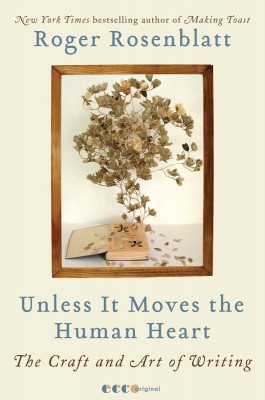For those who aspire not only to write well but to write in ways that really matter to prospective readers, Roger Rosenblatt’s
Unless it Moves the Human Heart: The Craft and Art of Writing (Ecco, 176 pages) should prove to be highly inspiring and instructive reading. Rosenblatt, an award-winning American writer and highly accomplished teacher of writing, distills his long experience as a writer and teacher into a composite narrative about an idealized writing class with a wide range of backgrounds and strengths in the writing craft. There, teaching a course that he calls “Writing Everything,” he wields with masterly flourish all the tools of pedagogy to instruct, goad, and inspire the class to write better than they’ve ever done before.

In that fictionalized graduate writing course, Rosenblatt tracks the progress of the students as they write short stories, poems, and essays “so that they might stretch a bit and concentrate on the strengths of each of the different forms.” And one of his most memorable guideposts to the class is this: “For your writing to be great—I mean great, not clever, or even brilliant, or most misleading of all, beautiful—it must be useful to the world. And for that to happen you must form an opinion of the world. And for that to happen you need to observe the world, closely and steadily, with a mind open to change. And for that to happen you have to live in the world, and not pretend that it is someone else’s world you are writing about.”
Read “An Inspirational Letter to My Students,” an excerpt from Roger Rosenblatt’s Unless it Moves the Human Heart in The New Yorker now!ABOUT THE AUTHOR:Roger Rosenblatt is an American journalist, author, playwright and teacher. A long-time columnist for
Time magazine, he began writing professionally in his mid-thirties, becoming literary editor and columnist for
The New Republic. Before that, he taught at Harvard University where he earned his PhD. In 2008 he was appointed Distinguished Professor of English and Writing at Stony Brook University, one of five such appointments in the SUNY system, where he currently teaches. His pieces for
Time magazine have won two George Polk Awards, awards from the Overseas Press Club, the American Bar Association, and others. He is the author of 14 books that have been published in 14 languages.
RELATED READINGS:In “The 300-Word Challenge,” an article he wrote for the March 24, 2011 issue of
The American Scholar.org, William Zinsser talks about his experience when he was invited to write 300-word essays on iconic American sites for a magazine called
Endless Vacations. He agreed to write 300-word condensations instead of chapters of his book
American Places. “The language is highly compressed. Facts are crammed into one sentence that I would normally spread over three or four sentences, adding rhythm and grace and some agreeable details. But nothing fundamental has been lost; the grammar and the syntax are intact…(The) English language is endlessly supple. It will do anything you ask it to do, if you treat it well. Try it and see.”
Read William Zinsser’s “The 300-Word Challenge” in The American Scholar.org now! In “The end of bookstores,” an article she wrote for the March 3, 2011 issue of TNR.com, Nicole Krauss observes that best-seller lists of
The New York Times Book Review now separately reflect the sale of e-books, which she says is an inevitable consequence of the fact that e-books already accounted for about 10 percent of book sales in 2010. “You had to read between the lines to find the real news,” Krauss says, “but there it was: To the growing list of things that will be extinct in our children's world, we can now add bookstores. Does it surprise us? Should we care?”
Read Nicole Krauss’s “The end of bookstores” in TNR.com now!